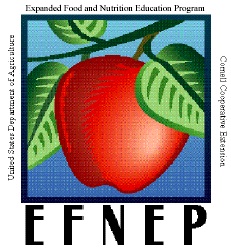 Across the state of New York, there are thousands of families who worry about their next meal, or whether there will be enough money for a weekly grocery-shopping trip.
Across the state of New York, there are thousands of families who worry about their next meal, or whether there will be enough money for a weekly grocery-shopping trip.
For the past 41 years, the Expanded Food Education and Nutrition Program has been using an evidence-based approach to help those families improve their nutrition and use their resources more wisely. Cornell faculty in the Division of Nutritional Sciences provide leadership for the program, and work with Cooperative Extension Educators across the state to conduct research and translate those findings into programming that helps families with children.
The program involves hands-on, experiential learning taught to individuals or small groups by a member of their own community. Local educators undergo extensive training designed by Cornell Nutrition faculty members.
“Many of our community educators haven’t had formal training before, because the focus in recruiting is to hire local community members who can relate to the course participants,” said Joan Doyle Paddock, senior extension associate in Nutritional Sciences. “We’ve developed and rolled out a 19-session training session that provides them with the latest information on nutrition and the most effective educational methods, both based on scientific research.”
Evaluation conducted a few years ago found that participants taught individually, rather than in group settings, reported greater improvements in nutrition behaviors. Based on this, the 19-session training was developed to improve group facilitation skills and the result has been improved outcomes for all types of participants.
“We’re not interested in just teaching people information; we’re looking for them to make behavioral changes in their lives,” she said. “Over the years, we’ve collected a lot of evidence that shows this program really does make a difference.”
Among one of the most important findings is this: EFNEP is yielding results for New York families. A 2008 study found that every $1 spent on the program reaps $10 in health benefits. Jamie Dollahite, associate professor of nutritional sciences, conducted the study, which looked at the costs and benefits of the program for 5,730 low-income adults who “graduated” from New York’s program.
“Cost-effectiveness was estimated to be as great as for many current health interventions, such as lifestyle changes to prevent diabetes,” Dollahite explained.
Other findings include:
- The program is most successful when the community educators believe in the value of the program and feel they are making a difference in the lives of EFNEP families.
- Nutrition education increases food security for low-income families, and there is a dose response relationship between the number of lessons received and increases in food security.
- Nutrition educators are motivated by perceptions of EFNEP’s value to families, relationships with their coworkers, and having a voice in decisions at work.



Speak Your Mind